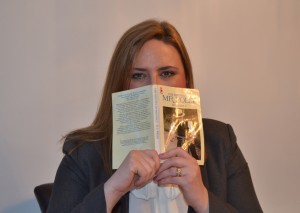How a re-reading of HG Wells novel ‘The History of Mr Polly’ inspired me to lead successful change in education.
As a 13 year old girl in a large comprehensive school, I would sit in my English lessons and wonder why I was being forced to read ‘The History of Mr Polly’ by H G Wells. As an avid reader, the reading was not the issue, but reading about a 40 year old man’s middle aged angst in 1910, who cares? BUT it has never left me, and I would recall the novel relatively regularly, and even more so since I turned forty myself.

I finally re-read the novel age forty one, and I can confirm it is totally fascinating. It is what we have all come to expect from H G Wells’ mastery. It is a perceptive and thoughtful novel that pinpoints the idiosyncrasies of human nature as well as offering a satirical look at society, and in the opening chapter, education. Ultimately, as all good literature should, it inspired me to make a change in my life, and The Full English Education Consultancy and Services was born.
Mr Gove’s suggested Reading List
Can I suggest that Michael Gove takes some time to read ‘The History of Mr Polly’? H G Wells’ feelings about the consequences of teaching by rote, large classes, unqualified or poorly qualified teachers are clearly documented. Wells’ comments serve as a timely reminder of the consequences of such an approach. Wells’ describes how Polly, before going to school, was a young boy with intelligence and imagination – unfortunately all of this was gone by the time his schooling had ended.
‘Mr Polly went into the National School at six, and he left the private school at fourteen, and by that time his mind was in much the same state that you would dear reader, if you were operated upon for appendicitis by a well meaning, boldly enterprising, but rather over worked and underpaid butcher boy who was superseded towards the climax of the operation by a left handed clerk of high principles but intemperate habits – that is to say it was a thorough mess…’
Humorous, pertinent, but how depressing? As a profession, this is what it appears we are being forced to slide back into!
In addition
‘….Mr Polly had lost of his natural confidence, so far as figures and science and languages and the possibilities of learning things were concerned. He thought of the present world no longer but as geography and history, as the repeating of names that were hard to pronounce, and lists of products and populations and heights and lengths, and lists and dates – oh! And Boredom indescribable!!’
Maybe this is what happened to Mr Gove? His inability to understand averages, his misunderstanding of the core principles of how to teach history, geography and science – as well as his misplaced view of literature. Can all of this be explained as a result of the education he received?
CREATING AN IDEOLOGY FIT FOR THE 21st CENTURY
Gove’s ideology of how to teach, and how students should learn, is nicely satirised by Wells. Unfortunately the ‘Boredom indescribable’ is too close to the truth too. I have worked in numerous institutions, and have many friends and colleagues in education who have spent many hours thinking very carefully about how to bring our subjects alive, and make them relevant for the students. Year on year teachers organise trips, revision sessions and outreach activities. This is in addition to the relentless planning, marking and feedback. School should never be just about leaning facts by rote (yawn!); it should always be about preparing them for life too. Our role is still to ensure their minds are not quashed, that they are equipped to think independently, and have morals and that they aim to lead good and decent lives.
Education, and particularly English, has been a political football for too long. In these times of constant changes, our role as a company is to help teachers ride the waves of change. We will support teachers and schools in the implementation of successful English curriculum across all of the key stages, as well as create relevant initiatives and staff training to improve literacy across the whole curriculum. Schools must continue to inspire students to learn, and most importantly, inspire and allow teachers to teach.
C Thomas – April 2014
